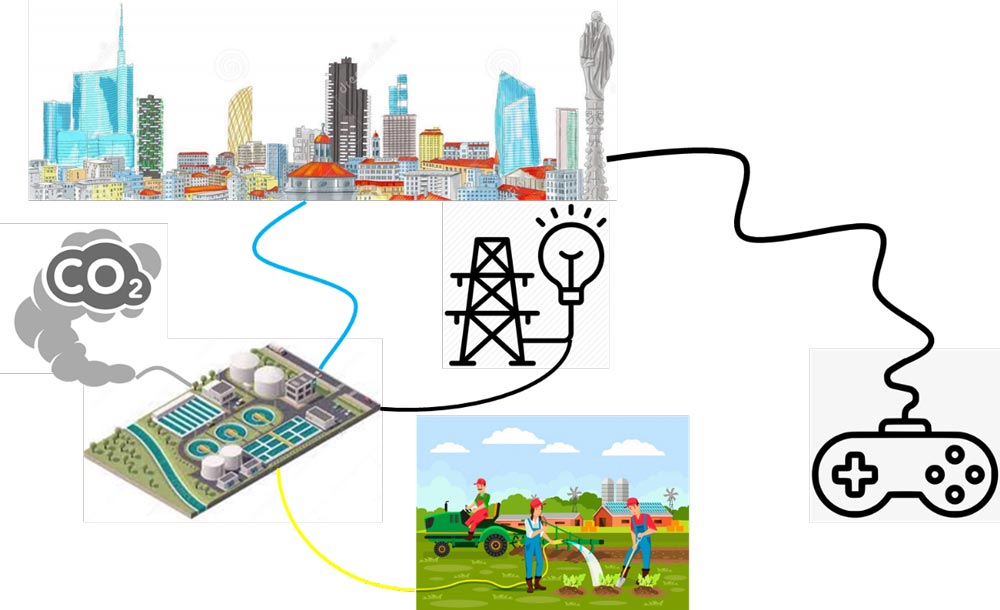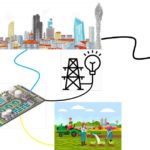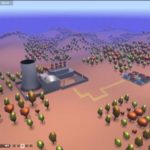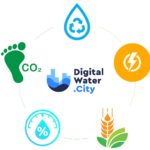Based on scientifically sound and validated wastewater treatment and crop growth models, the solution is a web-based serious game for near real-time audit of water reuse – carbon – energy – food – climatic nexus. The game aims at engaging the widest public as possible to raise awareness and overcome social and economic barriers to water reuse. The game-embedded visualization tool will allow citizens to interact with data and support the understanding of the complexity of the nexus of water availability, carbon emission, energy consumption, food crop productivity. It aims at communicating the benefits of water reuse in terms of impacts on each aspect of the nexus.
The gameplay is structured as a management game, in which the player is the mayor of a city that is decision-maker with a certain per-citizen economic, water, energy and carbon budget. The aim is to develop the city without depleting economic and environmental resources, so as to attract new potential inhabitants that wish to live in a sustainable and nexus-aware smart city.
The game is organized in interconnected layers, that represent the topics of the nexus. For each layer the player chooses amongst many options available and can observe as output the consequences of decisions, in terms of water and energy footprint, GHG emissions, food availability, economic and social issues.
The gamer can choose:

- City location and population (different water availability, different climatic conditions that influence water-energy-carbon-food-climate nexus);
- Energy sources;
- Wastewater treatment performances;
- Food crop;
- Economic, water, energy and carbon budget.
The gameplay is easy to use also by non-professionals in the water sector. The game will let the player understand the nexus that interconnects water, carbon, energy, food and climate, making him a more responsible user of natural resources and aware of the benefits of water reuse.
Challenges
Reuse of treated wastewater for irrigation purposes is a measure to reduce water stress and overexploitation of freshwater resources. It provides a sustainable solution to address water shortages in vulnerable regions and reduces pressure on freshwater resources. However, water reuse might increase the cost of water production due to additional treatment capacities and energy consumption at the treatment plant. For food production, water reuse can support the reduction of fertilizer use, improve the nutritional status of crops and reduce energy consumption for groundwater extraction. The impacts and benefits of water reuse are complex and interconnected. Their understanding requires to analyze the relationships between water availability, carbon emission, energy consumption and food crop productivity (referred as nexus).
Nexus thinking is often based on large-scale data and global water-energy-carbon-food-climatic interconnections. If this approach can drive global, international and national policies, it generally fails to support local governance. Tools are lacking to facilitate the understanding of the nexus at local scale and support decision making considering the various facets of the benefits and impacts of the practice. The nexus appear to far from local problems and decisions related to water reuse are driven by a single objective, such as the reduction of water stress.
Water reuse, carbon, energy, food and climate are interconnected by complex nexus that require a deep knowledge to support sustainable actions. The serious game is addressed to a wide public, that can enter with different profiles, varying from public stakeholders, who need a decision support tool, to children that can understand, by playing, the importance of water resource and the nexus with energy, food and climate changes. The serious game will be precise and detailed, in order to give affordable results for predicting scenarios, but in the same time easy to use and clear, for the didactic purposes. The interface must be simple and the gameplay attractive, but the results must be based on accurate calculations and fit with the complexity of the reality. The serious game could support a community of practitioners to better understand how water reuse, carbon, energy, food and climatic variables could be impacted by different policeis in the context of NEXUS.
Limitations of current practices
Energy and carbon footprint in wastewater treatment plants have been developed using real-time data in models developed in existing H2020 projects (e.g. ENERWATER, C-FOOT-CTRL, SMART-Plant), analyzing the contribution of each step of the treatment to the global energy consumption and greenhouse gas emission. Nexus have been analyzed as concern, for example, water – energy and carbon footprint or agricultural practices and water demand, but there is few information about the holistic approach that consider all together water reuse, carbon, energy, food and climate. Moreover, nexus evaluation is often based on large-scale data and global water-energy-carbon-food-climatic interconnections and is difficult to be fitted in local scale applications.
Tools are lacking to facilitate the understanding of the nexus at local scale and support decision making considering the various facets of the benefits and impacts of water reuse. Serious games are spreading in many applications, as they provide predictive scenarios based on real data, useful for stakeholders and policymakers. Their attractive interface makes them even a didactic tool to educate also the younger citizens to be more sensible and aware of the environmental interconnections with everyday life in a dynamic and interactive way.
Innovation
The serious game is based on a scientifically sound validated integrated model to evaluate water reuse-carbon-energy-food-climatic nexus. It is focused on water reuse practice and uses local real-time data to validate the evaluation of the scenarios. It provides a cross-domain real-time data flow and footprinting for a range of scenarios such as different climatic conditions, water availability, irrigated / fertigated crops, water demand and population, treatment performances and related greenhouse gas emissions. It can be used to raise stakeholders and public awareness about sustainability of water reuse and to improve public perception of water reuse in agriculture. It can also be used as a decision support tool for planning, providing results based on real data and calibrated models.

City tests
The serious game will be developed and tested in Milan. The tool will be based on off-line and real-time data from sensors, energy meters and direct GHG measures at the wastewater treatment plant of Peschiera Borromeo. Agricultural parameters will be derived from the pilot site in the plant. Data will be integrated in models to evaluate energy, water and carbon footprints. Results from modeling and from the serious game will be verified with the real conditions of the WWTP and reuse plot.
Contact solution
UNIVPM – Francesco Fatone




